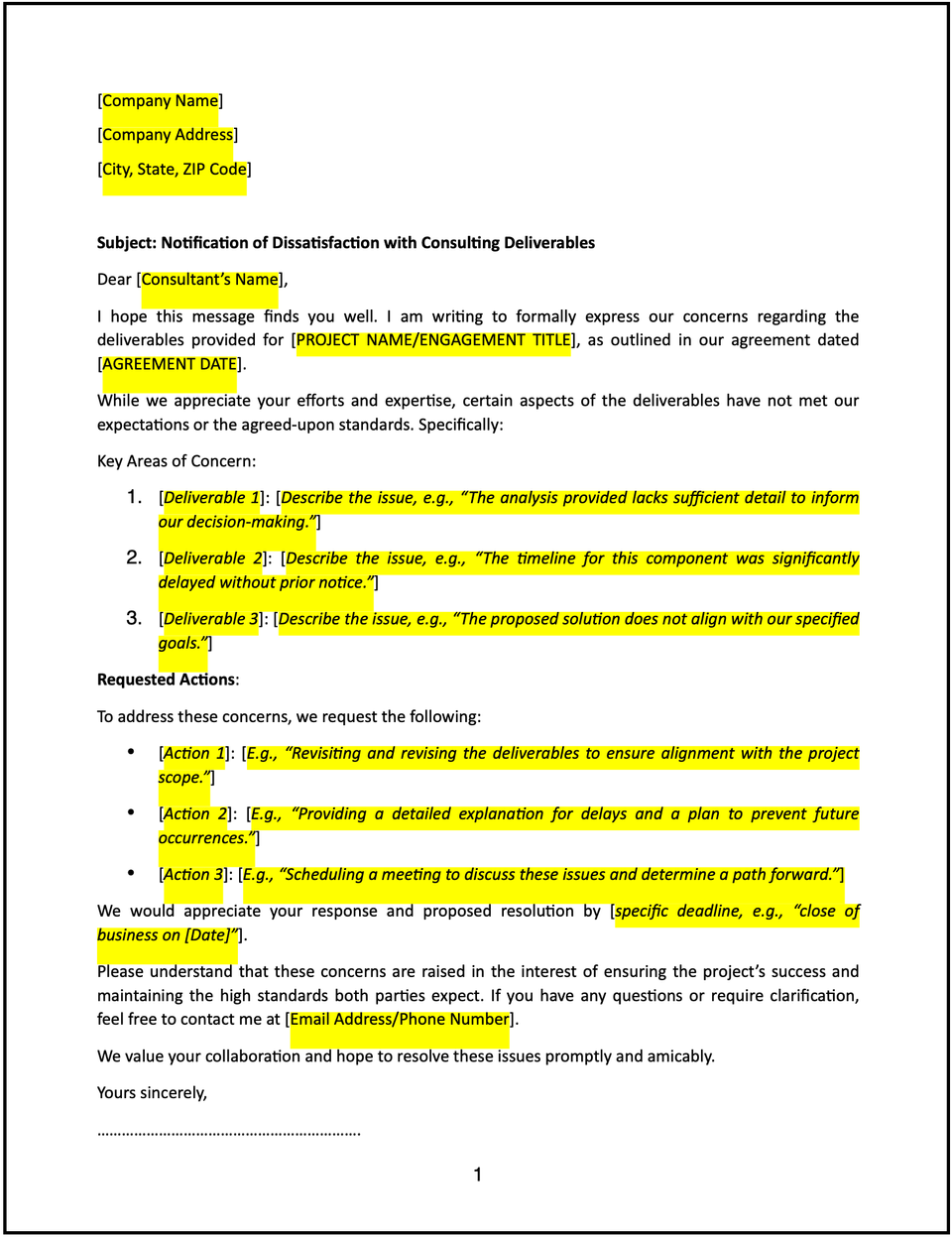Letter of dissatisfaction with consulting deliverables: Free template

Letter of dissatisfaction with consulting deliverables
A notification letter of dissatisfaction with consulting deliverables is a formal communication used to express concerns about the quality or adequacy of work provided by a consultant. This letter outlines specific issues, references the agreed-upon terms, and requests corrective actions to ensure alignment with expectations.
How to use this letter of dissatisfaction with consulting deliverables
- Open with an introduction: Address the consultant respectfully and reference the project or deliverables in question, using specific names or reference numbers.
- State the purpose: Clearly communicate your dissatisfaction with the deliverables, specifying the areas where they fell short of expectations.
- Provide details: Outline the specific issues, such as unmet objectives, inadequate quality, or deviations from agreed standards. Include examples, if applicable, to clarify the concerns.
- Reference the agreement: Highlight the terms of the contract or scope of work that were not met, ensuring the issues are framed within the agreed expectations.
- Request corrective actions: Politely ask for specific steps to address the concerns, such as revisions, additional work, or clarification. Include a deadline, if necessary, to ensure timely resolution.
- Maintain a professional tone: Ensure the letter is clear, respectful, and focused on fostering a constructive resolution.
- Reassure commitment: Emphasize your willingness to continue working together to achieve the desired outcomes.
- Provide contact information: Include details for the recipient to reach out with their response or for further discussion.
Benefits of using a letter of dissatisfaction with consulting deliverables
This letter ensures a structured and professional way to address concerns while fostering collaboration and resolution. Here’s how it helps:
- Promotes transparency: Clearly communicating concerns builds trust and encourages accountability.
- Reflects professionalism: A well-crafted letter demonstrates respect and commitment to constructive dialogue.
- Encourages improvement: Highlighting specific issues provides the consultant with actionable feedback.
- Prevents conflicts: Early communication of concerns helps avoid misunderstandings or escalations.
- Supports alignment: Addressing gaps ensures the deliverables align with project objectives and expectations.
Tips for writing an effective letter of dissatisfaction with consulting deliverables
- Be specific: Clearly describe the issues with the deliverables, referencing examples and agreed terms.
- Use professional language: Maintain a respectful and solution-oriented tone to encourage collaboration.
- Provide context: Briefly explain why the concerns are significant and how they affect the project’s goals.
- Highlight mutual benefits: Emphasize how resolving the issues will lead to a successful outcome for both parties.
- Include actionable steps: Share instructions for addressing the concerns, such as revisions or follow-ups.
- Keep it concise: Focus on the key points while ensuring the tone is professional and constructive.
Frequently asked questions (FAQs)
Q: What details should I include in this letter?
A: Include the project reference, specific concerns with the deliverables, relevant contract terms, and a request for corrective actions.
Q: Should I personalize the letter?
A: Yes, addressing the consultant by name and referencing specific deliverables demonstrates attentiveness and professionalism.
Q: Who typically sends this letter?
A: Project managers, business leaders, or organizational representatives overseeing the consulting project typically send this letter.
Q: How formal should this letter be?
A: The tone should be professional and respectful, focusing on fostering collaboration and resolution.
Q: When should this letter be sent?
A: Send the letter promptly after identifying the concerns to ensure timely corrective actions.
Q: Can this letter suggest specific revisions?
A: Yes, proposing detailed adjustments or revisions helps the consultant address the issues more effectively.
Q: Is acknowledgment from the recipient required?
A: While not mandatory, requesting acknowledgment ensures the consultant is aware of and addressing the concerns.
This article contains general legal information and does not contain legal advice. Cobrief is not a law firm or a substitute for an attorney or law firm. The law is complex and changes often. For legal advice, please ask a lawyer.


